What Causes Infertility?

One of the most stressful events a couple can experience is infertility. Understanding the potential causes of their failure to achieve conception helps them realize that they are not alone and that individualized care is the foundation of their journey to parenthood.
Overview
Many individuals planning to have children but who have not achieved conception are surprised to learn how common their problem is. Around 20 percent of U.S. couples seek medical care to achieve a pregnancy, according to Stanford University.
Only about half of those trying to get pregnant conceive easily. Around 10 percent of couples who are of reproductive age prove involuntarily infertile. Physicians identify an infertile male in half of these couples.
Despite the percentage associated with male problems, care has historically focused on females. This is because while men often avoid seeking medical advice, most women are accustomed to undergoing gynecological evaluations.
The Mayo Clinic notes infertile couples are those who have been unable to conceive after experiencing frequent and unprotected sexual relations for a year. The cause might track to either partner or to a combination of factors.
Causes in Men and Women
Males can be infertile due to a number of factors ranging from physical problems such as testicular damage and hormonal imbalances to psychological issues. A number of physical issues cause a low sperm count, an abnormal sperm structure, or both. Male fertility is also a reflection of overall health. Stanford University reports that men who follow a healthy lifestyle boost their chance of producing healthy sperm. These lifestyle options negatively contribute to male fertility:
- Smoking
- Extended use of marijuana and other drugs for recreation
- Chronic abuse of alcohol
- Use of anabolic steroids
- Overly zealous exercise
- Exposure to environmental hazards such as pesticides and heavy metals
- Tight underwear
According to ihr.com, nearly a third of infertile women cannot conceive because of failed ovulation. Around a fourth of couples are infertile because of the failure of the woman’s fallopian tubes to function adequately. Issues can range from mild adhesions to the complete blockage of a tube. As many as 40 percent of women who suffer from endometriosis prove infertile. Other potential causes include having an abnormal uterus, congenital abnormalities, or problems with cervical mucus.
The Mayo Clinic reports that these factors increase a woman’s risk of being infertile:
- Age
- Smoking
- Being overweight or underweight
- Sexually transmitted infections
- Excessive alcohol consumption
Treatment Options to Get Pregnant
A number of fertility treatment options give hope to couples seeking to conceive. Among the most frequent are intrauterine insemination (IUI), commonly used when a male is infertile or the lack of fertility is unexplained. Ovulation induction is appropriate when a woman either fails to ovulate or does so infrequently. In-vitro fertilization (IVF) often follows unsuccessful IUI attempts and is successful in treating fertility problems caused by a number of factors.







